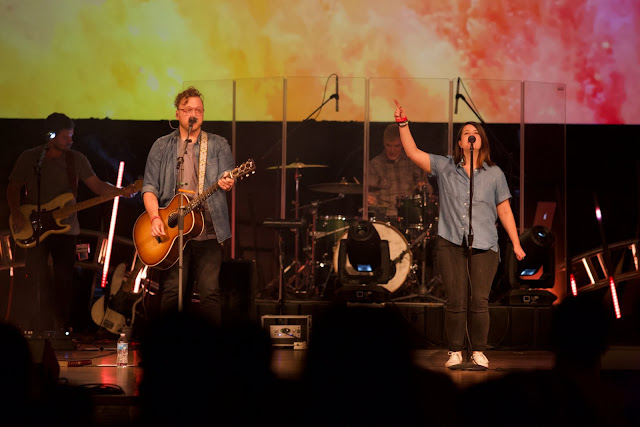A Drummer's Identity
You've got the job. You're the drummer. Now what? What do you do? What is the role of a drummer? You might be a drummer, you might work with a drummer, or you might just know a drummer. Whatever the case is, the question remains: What is the role of a drummer? and why are drummers so cool?
Well, I can't answer that last one, but together we can examine what I believe the role of a drummer is in church.
If you see yourself as the drummer of a worship band, I have some news for you. You have a greater role that's more important than being just a drummer. You're role is to lead others to worship a holy God. There is a lot of mental energy, including coordination of numerous limbs, involved in playing drums, so it can be very easy to forget why you are playing them in the first place. So how do you lead others to worship?
If your role is to lead others to worship God, playing the coolest, flashiest fill you know how to play every 8 bars is probably not going to work out for you. It might be super fun to play - I'll give you that. But you don't want to distract someone from the bigger picture. A good analogy to consider is the purpose of a picture frame. You don't want people to say, "Wow. What a great picture frame!" You want them to say, "Wow! What a great picture!" You want to bring people's attention to something greater than yourself.
Even if you're not playing in a church setting, you can apply this general concept to the song as a whole. You shouldn't want to steal the song's spotlight, and if you do, then not many musicians will want to work with you. Playing that cool drum fill might not be the best thing to do for the song either. That's why drummers are servants. We have the power to claim people's attention, yet we choose to serve instead. We serve the other musicians by playing complimentary rhythms and by providing a solid foundation to back up their parts and solos. We're not in the front. We play underneath what happens. We serve the song that way.
If your role is to lead others to worship God, playing the coolest, flashiest fill you know how to play every 8 bars is probably not going to work out for you. It might be super fun to play - I'll give you that. But you don't want to distract someone from the bigger picture. A good analogy to consider is the purpose of a picture frame. You don't want people to say, "Wow. What a great picture frame!" You want them to say, "Wow! What a great picture!" You want to bring people's attention to something greater than yourself.
Even if you're not playing in a church setting, you can apply this general concept to the song as a whole. You shouldn't want to steal the song's spotlight, and if you do, then not many musicians will want to work with you. Playing that cool drum fill might not be the best thing to do for the song either. That's why drummers are servants. We have the power to claim people's attention, yet we choose to serve instead. We serve the other musicians by playing complimentary rhythms and by providing a solid foundation to back up their parts and solos. We're not in the front. We play underneath what happens. We serve the song that way.
Drummers are dynamic leaders. Maybe not so much in personality types, but I mean they lead the dynamics of the song. They decide where the song is going. Are we getting louder or softer or staying the same? Don’t know? The answer lies in the drummer. As the drummer, it is YOUR job to communicate (nonverbally) where the song is going. To do this effectively, you have to know where you are, and you have to know what is next.
If you’re at the chorus, which is pretty big, and you know the bridge, which is even bigger, is next, then don’t play as full as you can during the chorus. Save some energy for the next section that’s bigger. You have to know where you are dynamically and where you’re headed dynamically.
Most of the time, the fills that you play that transition between sections of a song say it all. Are we going to drop out for the chorus? Play a fill that has space and finality. Are we going to play as fully as we can for the bridge? Play a fill that has motion and energy. You lead others dynamically with your fills.
Drummers sync with bassists. Some might say “Bassists sync with drummers” - who cares?! The bottom line is we play together! Your kick should match the rhythm of the bassist. If you learn the kick pattern of a song and the bassist doesn’t play that at all, who’s fault is it? The bassist’s? - nope. You’re to blame. There are two people here. You’re a team; succeed together or fail together. You’ll sound better together than you will by playing different rhythms (with few exceptions).
If you’re at the chorus, which is pretty big, and you know the bridge, which is even bigger, is next, then don’t play as full as you can during the chorus. Save some energy for the next section that’s bigger. You have to know where you are dynamically and where you’re headed dynamically.
Most of the time, the fills that you play that transition between sections of a song say it all. Are we going to drop out for the chorus? Play a fill that has space and finality. Are we going to play as fully as we can for the bridge? Play a fill that has motion and energy. You lead others dynamically with your fills.
Drummers sync with bassists. Some might say “Bassists sync with drummers” - who cares?! The bottom line is we play together! Your kick should match the rhythm of the bassist. If you learn the kick pattern of a song and the bassist doesn’t play that at all, who’s fault is it? The bassist’s? - nope. You’re to blame. There are two people here. You’re a team; succeed together or fail together. You’ll sound better together than you will by playing different rhythms (with few exceptions).
If you're not a drummer, I hope you learned what I believe drummers are responsible for. If you call yourself a drummer, then I hope that I have provided some clarity to your role in the band. So go and serve. Serve musicians by not taking the spotlight, by being the person everyone relies on to communicate the dynamics of the song, and by playing the same rhythm as the bass.






in all your blogs I’ve read, you really get to the heart of the matter. it seems that it’s hardest for drummers to feel like they’re “leading worship,” because they’re possibly the most disconnected from the lyrics and from the congregation, especially if they’re in a cage.
ReplyDeleteLooking forward to more great content!
Jonnie Brown is a legend.
ReplyDelete